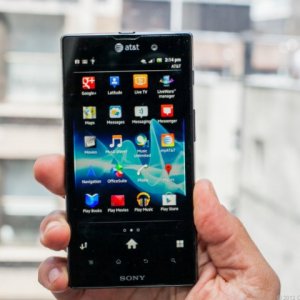
The affordable $99.99 Xperia Ion is more than just Sony's first U.S. smartphone to bear the Sony name after its Ericsson divorce, it's also the company's first foray into 4G LTE. Though similar to its international siblings, this American model is less flashy than the Sony Xperia line available across the pond. That's a real shame too since I really liked the Sony Xperia S as well as the Xperia P when I saw them up close at CES in January. Those handsets, while no speed demons to be sure, at least had a seductively stylish look driven home by a clear illuminated notification bar in their base.
It's not that the Xperia Ion doesn't try to impress in other ways. Besides its swift LTE data connection, it links into Sony's large library of music and movie content. But even those attributes are overshadowed by its aging Android Gingerbread software and an old Snapdragon S3 processor. The same goes for the Ion's camera performance, which isn't as capable as I had hoped. To catch fire in the U.S. market and compete with other successful phone makers, Sony really needs to step up its game with a lust-worthy halo device. Unfortunately, the Xperia Ion isn't it.
The good: The affordable Sony Xperia Ion has solid call quality and swift 4G LTE that ties into Sony's vast entertainment empire.
The bad: Lackluster images and video belie the Xperia's claimed 12MP camera. It's also held back by an old processor and an outdated OS.
The bottom line: The $99.99 Sony Xperia Ion looks like a good Android deal but its weaknesses make it not worth even the budget price.
A glossy black monolith of a smartphone, the new Sony Xperia Ion is handsomely styled. While it lacks the daring design elements of its European cousins, namely the Xperia NXT series, the Xperia Ion does flaunt an elegant if sober look. For instance, the handset doesn't have the futuristic notification bar that splits the Xperia P, S, and U's base in half. Translucent, that bar illuminates to alert you when important system events occur such as new messages and missed calls. It's a shame it's only found on the international Xperia models.
That said, the Xperia Ion has a sophisticated feel enhanced by its curved metal back and soft-touch trim coating the phone's rear top and bottom edges. Further lending to the phone's premium aesthetic is its hefty 5.1-ounce weight. Both the metallic backing and large 4.55-inch (1,280x720-pixel resolution) LCD screen however smudge easily and are fingerprint magnets.
In addition, I'm not a big fan of the Xperia Ion's display, which is dark and has a bluish cast, resulting in inconsistent colors. Photos on Web pages looked muted, while details in dimly lit sections of video were lost. I especially noticed the Ion's poor display when I viewed it next to HTC's superphone on AT&T, the HTC One X. The One X's screen (4.7-inch, 1,280x720 HD Super LCD) was noticeably brighter (with both phones set at maximum brightness) and its viewing angles were much wider than the Xperia's. The HTC One X also painted colors with a warmer, more pleasing palette.

Another drawback to the Xperia Ion's design is its lack of a removable battery, though the phone does have a microSD card slot to add more storage. Above the screen is a front-facing 1.3 megapixel camera (720p) for vanity shots and video chat. Below the display are four traditional Android Gingerbread symbols for Menu, Home, Back, and Search. Don't be fooled, these symbols aren't actual buttons, merely pictures drawn onto the device.